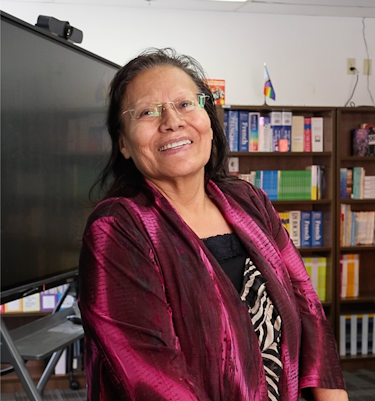Upcoming events
Stay informed about our upcoming activities at the College and in the community.
Free
Our cookies and those of our partners help improve your experience and analyze your use of the website. To learn all about cookies, check our privacy policy

On September 30, on the National Day for Truth and Reconciliation and Orange Shirt Day, we pause collectively to reflect on the wounds left by the residential school system, while also recognizing the resilience and vitality of Indigenous communities today.
For Collège Nordique, it is above all an invitation to listen—listen to the stories, the languages, and the knowledge that surround us. This is why we wish to share the testimony of Cecilia Wood, a Tłı̨chǫ language teacher and interpreter in Yellowknife.
In her virtual and in-person classes at Collège Nordique, Cecilia accompanies learners who each carry a unique story.
For Julianna, for example, learning the language is a way to reconnect with her roots and to pass on this cultural richness to her children, who sometimes join her in class. Her mother, Celine Mackenzie Vukson, a Tłı̨chǫ woman and a PHD student with Trent University in Peterborough, grew up with Cecilia in Behchokǫ̀. Celine remembers Cecilia’s father, Jo Drybones, as an interpreter for Chief Jimmy Bruneau. Celine recently reflected on this connection and shared the following heartfelt words with Cecilia:
“She (Julianna) loves learning. I told Julianna who your dad was as Chief Jimmy Bruneau’s interpreter and well respected. Told her she was in good hands in your Tłı̨chǫ class. Chief Jimmy Bruneau was great great paternal uncle to Julianna…I think we are lifelong learners and friends because of their legacy and connections (Chief Bruneau with his interpreter Jo Drybones).”
At Julianna’s side, Mike, who is non-Dene, is living an equally inspiring journey. He was the one who first suggested taking the classes together out of a sincere desire to be able to communicate with Julianna’s Tłı̨chǫ family. Having already learned Spanish, he understands the challenges of language learning and knows what it means to live in a country where people do not speak your mother tongue. Together, Julianna, Mike, and the other Tłı̨chǫ language learners in the class embody the beauty of the intergenerational and intercultural bonds that are created through language.
Since 2004, Cecilia has worked as an interpreter at the hospital. Her role goes beyond translation: she is a bridge between worlds, creating a space where language becomes a tool of care, understanding, and dignity.
“When I see a non-Dene person speaking Tłı̨chǫ, it’s very moving. It’s exciting to see someone who didn’t grow up with the language make the effort to learn it, to speak it, and to help keep it alive.”
She recalls a doctor who, after just a few months of learning, greeted her in Tłı̨chǫ in the hospital cafeteria. The surprise and admiration of her colleagues transformed this simple exchange into a memorable moment—a reminder that language can open unexpected doors and create genuine connections.
In addition to her interpreting work, Cecilia is deeply involved in Tłı̨chǫ Yatıì courses at Collège Nordique. Alongside Rosie Benning, the language class facilitator and Director of Education and Training, Cecilia guides students in learning the language, bringing her voice, experience, and stories into the classroom.
Cecilia’s presence is invaluable: it allows learners to experience the language from a Dene perspective and benefit directly from her authentic life stories. As she often says, teaching a language also means transmitting a worldview and a bond with the community.
What Cecilia shares echoes many initiatives supported by Collège Nordique. Each time someone commits to learning Tłı̨chǫ or Wıı̀lıı̀deh, it is not only about vocabulary or grammar—it is an act of respect and of relationship-building.
In partnership with the Tłı̨chǫ Government and communities, learning spaces are being created to make these languages accessible to more people. Immersive cultural activities, such as beading, hide-tanning camps, and workshops on medicinal plants, make it possible to live the language rather than simply study it. These initiatives support the transmission of Indigenous knowledge and emphasize its importance.
Truth and reconciliation is not an abstract concept. It is a path built each time someone chooses to learn a few words of Tłı̨chǫ to say hello, each time a space is created for an Indigenous language course, each time a voice like Cecilia’s is heard and valued.
On this National Day for Truth and Reconciliation, we thank all those who, like Cecilia, carry their language with pride and share it with generosity. Their courage and passion remind us that reconciliation begins with small, daily gestures which, woven together, transform our communities.
👉 Learn more about our actions toward truth and reconciliation
Published on September 30th 2025
Loading
Thank you for subscribing